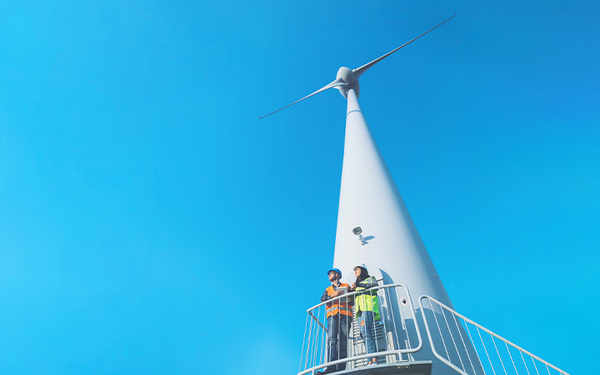
Energy and Climate Law
Understanding energy and climate law as an opportunity – shaping the concepts of the future with us
The current developments resulting from the European energy crisis present stakeholders from a wide range of sectors with a multitude of new and extreme challenges. The requirement of energy and climate policy is clear: all sectors should (and must) be comprehensively transformed – through more efficient energy use, or specifically through the further expansion of renewable energies, the use of innovative technologies or the digitalisation of the energy industry. Companies that supply and consume energy must adapt to the new circumstances in the short term – those who hesitate are putting their competitiveness at risk. PwC supports you in this extensive transformation process with comprehensive and long-standing expertise in the energy sector, assisting you strategically, legally, fiscally and economically. This applies, in particular, to dealing with the current energy crisis, adapting to the numerous new regulatory requirements, necessary contract design, support with official procedures, epresentation in litigation proceedings and project organisation.
The development and optimisation of energy generation (conventional and renewable)
By 2030, the share of renewable energies in gross electricity consumption is to be increased to 80 %. The implementation of this energy and climate policy requirement is a task for society as a whole, and a challenge for all market players. Regardless of whether you generate electricity or heat from fossil or renewable energy sources in the future: new projects will entail many legal facets. We smooth the way for you through the myriad of regulations and advise you regardless of the size of your project.
This is how PwC Legal supports you
Our lawyers advise you on:
- The establishment and expansion of decentralised energy generation structures
- Cooperation between industry and energy supply
- Direct marketing and participation in tenders
- The financing of projects and transactions
- Ensuring effective customer retention
- The construction and use of renewable energies: PV, wind (offshore, onshore), hydro power, geothermal energy
- The creation of decentralised concepts such as CHP/contracting models
Procurement and distribution of energy
Due to the current gas shortage situation and the energy supply emergency plans, many new laws have been created, and legislative changes made. In addition, accompanying legal ordinances are to provide guidelines for implementation in conformity with the law. These far-reaching changes pose new challenges for energy suppliers, both in sales issues and in energy procurement. There is a significant need for action at the interface between sales, trade/procurement and controlling, in order to be able to react appropriately to the changed framework conditions.
This is how PwC Legal supports you
Our lawyers advise you on:
- Determine appropriate mark-ups for price and volume risks in view of increased procurement costs
- Evaluation of sales calculations in the individual client segment under the consideration of risk aspects
- Preparation of (regular) price adjustments for basic / substitute supply and in the special customer sector
- Drafting consumer contracts
- Questions on antitrust, data protection, warranty, general terms and conditions and competition law
- Development of new acquisition tools
- Enforcement of contractual and statutory claims
Grid operation (electricity, gas, [district] heating, hydrogen)
The energy industry has always been highly regulated. The density of regulation continues to increase significantly in view of Germany’s (and the EU’s) energy and climate law ambitions. We keep an eye on the regulatory framework and developments in climate policy for you, and check the specific respective circumstances for legal conformity. Since the beginning of regulation, for example, we have been intensively involved in the formation of network charges, providing legal support to network operators vis-à-vis regulatory authorities and assisting them in court disputes – all the way to the Federal Supreme Court. In this way, we have achieved numerous successes for network operators in hundreds of proceedings over the past years, and have thus contributed to shaping the regulatory framework.
This is how PwC Legal supports you
Our lawyers advise you on:
- All regulatory matters pertaining to the formation of network charges, as well as the corresponding administrative procedures vis-à-vis the regulatory authorities and before the courts
- All network access issues, e.g. in connection with third-party transmission requests
- Application for (and awarding of) concessions
- Connection of energy generation plants (renewable or conventional) to the grid
- Implementation of measures to remove grid bottlenecks
- Non-discriminatory procurement of (equalisation) energy
- The streamlined and compliant design of network operation
- Involvement of service providers and consideration of cooperation with third parties
Digitalisation of the energy industry / metrology
The frequency of new regulatory requirements in the area of transport, distribution and metering is increasing significantly, thereby forcing energy suppliers large and small to respond through professional regulatory management. At the same time, regulation offers a great opportunity to open up new business models through smart meter infrastructure that enables a significantly more efficient energy supply. In addition, the progressive fragmentation of the (electricity) generation market is placing increased demands on the structure and control of the grids. Emergency supply (and the supply of larger consumers) will remain important in the long term.
This is how PwC Legal supports you
Our lawyers advise you on:
- The takeover of further network areas
- The classification of regulatory effects on necessary investments
- The implementation of smart meter rollout efforts
- Appeals against decisions of the regulatory authority
- Operation of Smart Meter Gateways
- Compliance with comprehensive data protection standards
- Ensuring a suitable metering infrastructure
Electromobility / New Mobility
A successful energy transition can only succeed with a transport transition and the associated far-reaching decarbonisation and automation of the transport sector in the spirit of “New Mobility”. While e-mobility harbours great potential, it poses significant regulatory challenges when it comes to implementation.
This is how PwC Legal supports you
Our lawyers advise you on:
- Integration of a mobility concept into existing/planned energy concepts (Charging@Work, Charging@Public or when combined with Charging@Home and bidirectional charging)
- Coordination with the authorities and compliance with regulatory obligations
- Review and optimisation of the cost burden
- Identifying relevant funding programmes and funding resources
- Ensuring suitable charging pole infrastructure, charging current procurement and billing
- Development of new company car concepts
- Implementation of site integration
Energy-intensive industry
Energy-intensive companies are facing particular challenges due to current developments and a necessary energy transition: on the one hand, a location-specific supply of energy is required that offers the highest possible degree of supply and planning security in terms of costs, but, on the other hand, it must also score top marks with a comprehensive sustainability concept. For a future-oriented positioning, it is, therefore, essential to use sources of potential for energy cost reduction as optimally as possible, without losing sight of a consistent decarbonisation strategy.
This is how PwC Legal supports you
Our lawyers advise you on:
- The creation and implementation of sustainable energy concepts (on-site and off-site)
- Optimising energy costs and making the best possible use of subsidies
- Ensuring the security of supply
- An application for funding
- The identification of new growth areas
- The development of future-oriented supply models, e.g. through so-called Power Purchase Agreements (PPA)
- Questions relating to European and national emissions trading (EU-ETS/ SESTA or BECV)
CO2 Reduction, Sustainability, Net Zero
In December 2019, the EU detailed its “Net Zero” agenda as a binding strategy to combat climate change. This ambitious goal for energy suppliers and energy-intensive industry means that they must fundamentally transform their business models, operational processes, supply chains and services/products. From a strategic point of view, companies must, therefore, ask themselves to what extent their business model, products and services will be affected by climate change, and the resulting changes in social demands, political influences and the assessment of the financial world.
This is how PwC Legal supports you
Our lawyers advise you on:
- Identifying risks related to sustainability, the environment and resource scarcity
- Reporting of non-financial information to stakeholders
- Identification and implementation of projects to achieve/increase energy self-sufficiency
- Compensation through CO2 certificates / the implementation of emissions trading (national and European) and the documentation of guarantees of origin
Hydrogen / Power-to-X
In order to achieve the climate targets set, green hydrogen and electricity-based fuels, power and basic materials, also known as PtX (“Power-to-X”), will make a decisive contribution.
Particularly in energy-intensive industries that are characterised by high emissions, such as the steel or chemical industries, PtX can offer an alternative solution to previously used fossil fuels. PtX also lends itself to air and long-haul transport in the transport sector.
This is how PwC Legal supports you
Our lawyers advise you on:
- Structure of electrolysers
- Development and expansion of hydrogen networks
- Implementation of cooperation projects
- Application for funding





